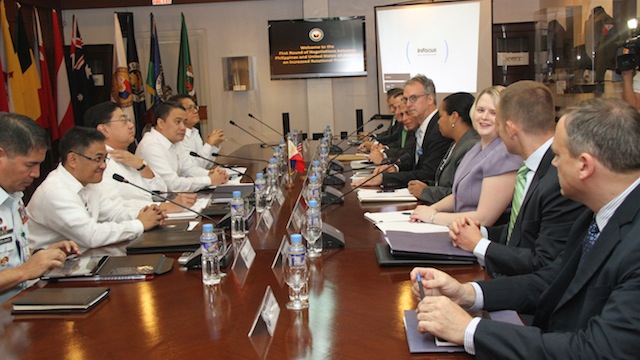
TALKS BEGIN: Philippines and US
Rival factions of the Philippine Left echo each other in opposing a plan to increase the rotational presence of US troops in the country and allow them to deploy aircraft and ships for disaster and maritime security operations.
Rival factions of the Philippine Left echo each other in opposing a plan to increase the rotational presence of US troops in the country and allow them to deploy aircraft and ships for disaster and maritime security operations.
But a popular government has thrown its full support behind this in the wake of
The Philippines
and US panels hold the first round of closed-door talks on Wednesday, August
14, at Camp Aguinaldo
"We begin our negotiation... with the end in view of coming
out with a framework that will further enhance our existing robust defense
relations, so I exhort both panels to remain candid and frank so that the
outcome of this undertaking will redound to the best interest of our two
countries," said defense undersecretary for defense affairs Honorio
Azcueta in his opening statement.
Senate President Franklin Drilon and Speaker Feliciano Belmonte Jr
have been supportive of the talks as long as the plan will not violate the
Constitution and the Visiting Forces Agreement, the treaty that the Senate ratified
to govern the presence of foreign troops in the Philippines
Foreign Affairs Assistant Secretary Carlos Sorreta, head of the
Philippine panel, reiterated this. “We would like to assure the Filipino people
that your government is committed to defending and protecting the country’s
sovereignty and territorial integrity," he said in a statement.
Political activists said the Aquino government is wrong to think
that the US will fight with
the Philippines against China Philippines
is quick to surrender its sovereignty, the sole preoccupation of the US
READ: [Asia Pacific Bulletin] PH's security cooperation with US, Japan

STOP
"Bayan is opposed to any Chinese incursion or occupation of our islands in the West Philippine Sea but bringing in the
"The
Reyes led a group of about 30 militants who staged a protest at
In the House of Representatives, Akbayan Rep Walden Bello issued a statement sharing Bayan's position and calling the talks a "pact with the devil."
“It is the height of irony that in our collective campaign to secure our sovereignty against
The Philippine and the
For Foreign Secretary Albert Del Rosario, this means military modernization can begin before the the Armed Forces acquires its own modern equipment.
"Maritime security and maritime domain awareness will be given a boost even before we have ships and aircraft we need. And even before we have the advanced and sophisticated hardware we wish for we will know how to operate and maintain them," Del Rosario said on Monday's press conference.
The Philippine Air Force (PAF) is finalizing plans to purchase 12 fighter aircraft from Korea. On top of the two Hamilton-class cutters from the U.S. and the naval helicopters that will arrive in December, the Philippine Navy is also planning to acquire 2 new frigates and possibly a third Hamilton-class cutter.
Aside from Sorreta, the Philippine panel members are Defense
Undersecretary Pio Lorenzo Batino, Justice Undersecretary Francisco Baraan III
and Defense Assistant Secretary Raymund Quilop.
The US
How about drones?
Long before these talks, US troops have been in and out of the country, specifically in
Davao City Mayor Rodrigo Duterte divulged that the
"The
READ: Duterte says no to drones
A New York Times article, "The Drone Zone," alleged that the
They said drones are used in the
In an exclusive report citing intelligence sources worldwide, Rappler executive editor Maria Ressa detailed in a 2012 report how a team of US and Filipino soldiers used drones to spy on an Abu Sayyaf camp in Sulu.
Diplomacy
Reyes warned that the new agreement would allow the
"Our country is transformed into one big military facility or
depot for foreign troops and weapons. It is no longer consistent with our
constitution and it is no longer consistent with national interest," said
Reyes.
Reyes and Bello pushed for
diplomatic means to resolve the dispute with China
"The only option left for the Philippines is to aggressively
pursue our claims through all diplomatic means and to be self-reliant in
building its own credible defense posture and not to rely on the US and not to
be dragged in the US agenda in the Asia Pacific."
One, "promotion of the demilitarization of the Western
Pacific". Two, "pushing states to prioritize diplomatic solutions and
multilateral fora to solve territorial disputes instead of resorting to force,
in the same manner that the Philippine government brought up its dispute with
China for adjudication with the United Nations' International Tribunal on the
Law of the Seas." And three, "forceful citizen diplomacy for peace."

The commies are like ostriches with their heads buried in the sand. They talk about Philippine sovereignty and peaceful negotiations with the Chinese, while China laughs, thumbs its nose at them, and aggressively occupies more and more of Philippine claimed territory. They deny the true nature of increased Chinese military aggressiveness in the South China Sea and the need for a mutual defense relationship with a strong ally.
ReplyDeleteBAYAN (Bagong Alyansand Makabyan--New Patriotic Alliance) is a Communist Party of the Philippines umbrella front organization and Renato Reyes is a long-time CPP activist. These quasi-Maoist front groups have consistently opposed any US military presence in the Philippines.
Akbayan is a breakaway Marxist-Leninist-Socialist organization whose leaders split from the Maoist CPP back in the mid-to-late 1990s. Walden Bello is a long-time opponent of the US military presence in the Philippines and Asia as whole. Bello headed up a think tank, Focus on the Global South, based at Chulalongkorn University in Thailand, that produced several lengthy studies that were nothing more than scathing propaganda attacks against the US military presence in the Philippines.